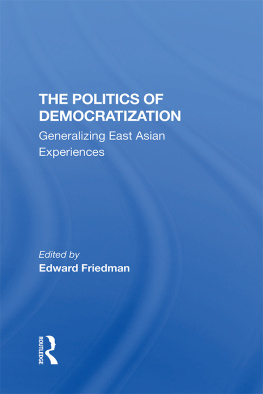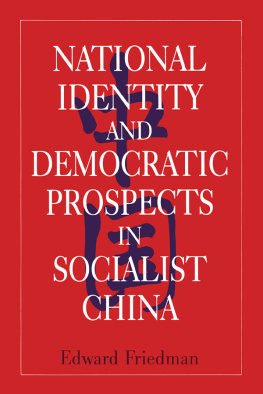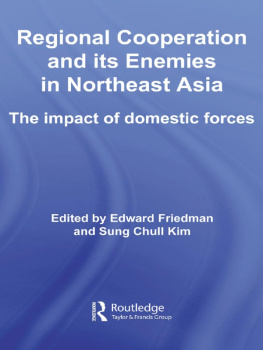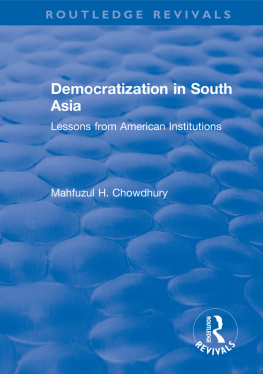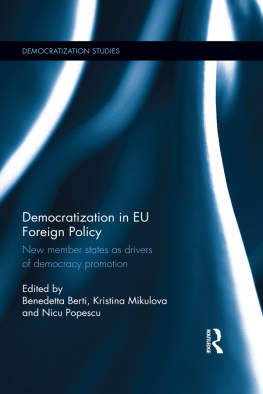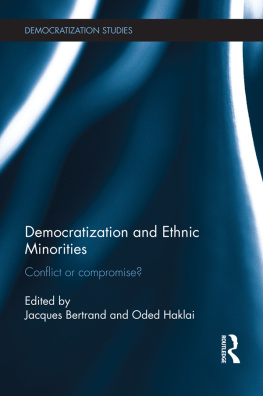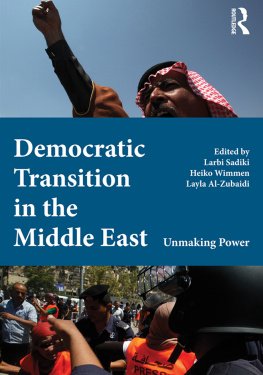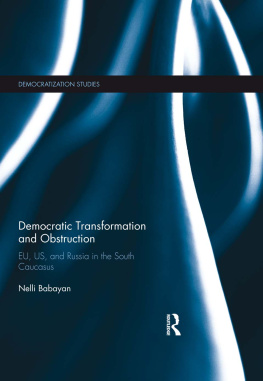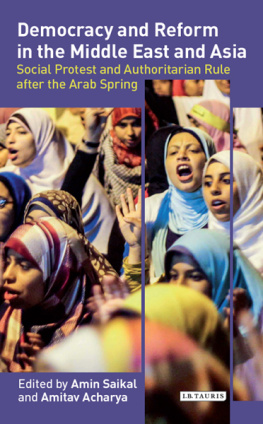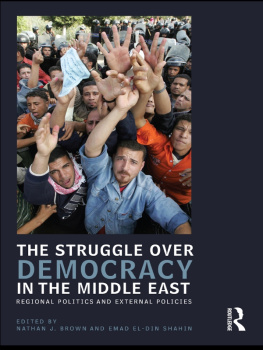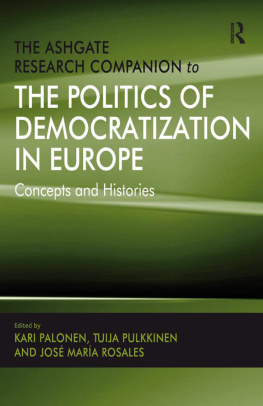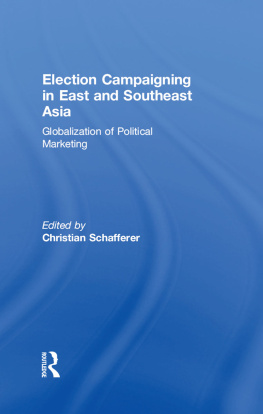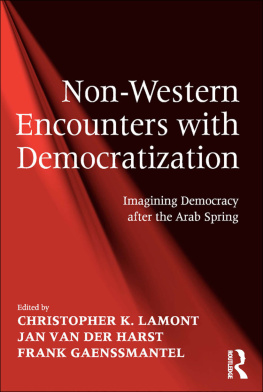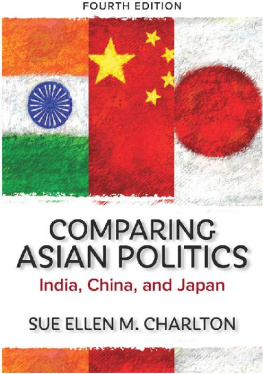The Politics of Democratization
Transitions: Asia and Asian America
Series Editor, Mark Selden
The Politics of Democratization: Generalizing East Asian Experiences, edited by Edward Friedman
Our Land Was a Forest: An Ainu Memoir , Kayano Shigeru
The Political Economy of China's Financial Reforms: Finance in Late Development, Paul Bowles and Gordon White
Reinventing Vietnamese Socialism: Doi Moi in Comparative Perspective , edited by William S. Turley and Mark Selden
FORTHCOMING
Privatizing Malaysia: Rents, Rhetoric, Realities, edited by Jomo K. S.
The Origins of the Great Leap Forward: The Case of One Chinese Province, Jean-Luc Domenach
City States in the Global Economy: Industrial Restructuring in Hong Kong and Singapore, Stephen Chiu, Kong-Chong Ho, and Tai-lok Lui
Unofficial Histories: Chinese Reportage from the Era of Reform, edited by Thomas Moran
Workers in the Cultural Revolution, Elizabeth Perry and Li Xun
Twentieth-Century China: An Interpretive History, Peter Zarrow
Cooperative Innovation and Late Development: Technological Catch-up in Japan, Donna L. Doane
Moving Mountains: Women and Feminism in Japan, Kanai Yoshiko
The Middle Peasant and Social Change: The Communist Movement in the Taihang Base Area, 1937-1945, David Goodman
The Chinese Triangle and the Future of the Asia-Pacific Region, Hsin-huang Michael Hsiao and Alvin So
Japanese Colonialism in Taiwan, Chih-ming Ka
The Politics of Democratization
Generalizing East Asian Experiences
Edited By
Edward Friedman
First published 1994 by Westview Press, Inc.
Published 2019 by Routledge
52 Vanderbilt Avenue, New York, NY 10017
2 Park Square, Milton Park, Abingdon, Oxon OX14 4RN
Routledge is an imprint of the Taylor & Francis Group, an informa business
Copyright 1994 Taylor & Francis
All rights reserved. No part of this book may be reprinted or reproduced or utilised in any form or by any electronic, mechanical, or other means, now known or hereafter invented, including photocopying and recording, or in any information storage or retrieval system, without permission in writing from the publishers.
Notice:
Product or corporate names may be trademarks or registered trademarks, and are used only for identification and explanation without intent to infringe.
Library of Congress Cataloging-in-Publication Data
The Politics of democratization: generalizing
East Asian experiences / edited by Edward Friedman.
p. cm.
Includes bibliographical references and index.
ISBN 0-8133-1805-X (hardcover).ISBN 0-8133-2265-0 (pbk.)
1. DemocracyEast Asia. 2. East AsiaPolitics and government.
I. Friedman, Edward.
JQ1499.A91P65 1994
321.8'095dc20 94-26151
CIP
ISBN 13: 978-0-367-29508-0 (hbk)
For SAM FRIEDMAN
Contents
, Edward Friedman
, Edward Friedman
, Masanori Nakamura
, David Arase
, Yasunobu Sato
, Tun-jen Cheng and Eun Mee Kim
, Heng Lee
, Ming K. Chan
, Hung-mao Tien
, Hsin-Huang Michael Hsiao
, Su Shaozhi
, Stephen Manning
, Edward Friedman
Guide
Sincere thanks go to the China Times Cultural Foundation, the Korea Trader's Scholarship Fund, the Asia Pacific Educational Foundation, the Pennsylvania State University Center for East Asian Studies, the Association for Asian Studies China and Inner Asia Council, and also the Office of International Studies and Programs of the University of Wisconsin in Madisonfunders for a 1990 summer conference. Of course, the views expressed in this book are not the responsibility of the funders. Diane Morauske typed the manuscript. Her patient assistance over the years is deeply appreciated. Mark Selden read and criticized the manuscript and then gave wise analytic and editorial comments on a revised manuscript. Someday I hope to meet the scholarly standards that Mark Selden holds so high.
Edward Friedman
EDWARD FRIEDMAN
The authors of this volume suggest that East Asia's rich experience with democratization, both successes and failures, can help clarify the politics of democratization as a global phenomenon. The book constitutes the first systematic, comparative, and theoretical exploration of democratization in East Asia, the world's most dynamic economic region in the second half of the twentieth century.
In conflict with the vital reality of democratization in Eastern Asia, famous leaders of Eastern Europe's great 1989-1990 democratic revolution, such as Vaclav Havel, experienced their transition from despotism to democracy as a transition from Asia to Europe, with Asia standing for despotism and Europe for democracy. There seems to be a long and deep impact from the early modern era when Montesquieu contended that climate and geography inhibited liberty in the Sinic world and Hegel found Asians frozen beyond die reach of freedom. This perspective was rooted in an experience of European liberty sprouting from a medieval darkness in which fragile shoots of liberty were long threatened by despotic invaders from AsiaMongols, Ottomans, and Muslims.
This categorical opposition of democratic Europe and despotic Asia was reinforced by imagining a West whose origin lay in an ancient and democratic Athens fighting to survive against Asian tyrants from Persia. Historical presuppositions linking Asia to despotism act as cultural blinders that keep westerners from focusing on the democratizing East Asian experience, from understanding democratization as a truly universal, human phenomenon. Historical cultural blinders may predispose westerners to believe that post-World War II Japan is not truly democratic despite its democratic political system.
Historically understandable Western preoccupations skew the Western perspective on democratization. With the institutionalization of democracy in the sixteenth century in the Dutch republic, a new political form began to confront despotism and inspire people globally. Republican institutions spread to England, America, and France over the next two centuries, followed by a series of failed attempts to consolidate transitions to democracy in former French, Spanish, and Portuguese colonies in Latin America and the Caribbean. Observers tried to make sense of the starkly different outcomes. Why did some nations fail to institutionalize political freedoms even though others succeeded?
Two explanations seemed most compelling. Both found that democracy had preconditions. One focused on the realm of values, the other on the socioeconomic realm. In these perspectives, without a solid democratic cultural heritage or a large middle-class socioeconomic foundation, the democratic political edifice that people attempted to erect would end up very shaky, and eventually come crashing down. Much illuminating scholarship ensued concerning democratic values and middle-class cum market domination as preconditions for democratic consolidation.
Given these presuppositions, Japan and the rest of East Asia are not readily treated as authentically democratic. In the 1980s, an American specialist on Japan concluded, "There is... one important test Japanese parliamentary democracy has not yet faced: the transfer of power between parties with different ideologies." The conventional wisdom is that Japan's harmony-oriented political culture may not be capable of real conflict as in Western democracies. Political culture, in this view, makes the West truly democratic, whereas, in Japan, one conservative party, the Liberal Democratic Party (LPD), simply stays in power perennially. So deep are these doubts about an Asian capacity for democracy that even the loss of power by the LDP at the start of the 1990s may change little at the level of presupposition and theory.

